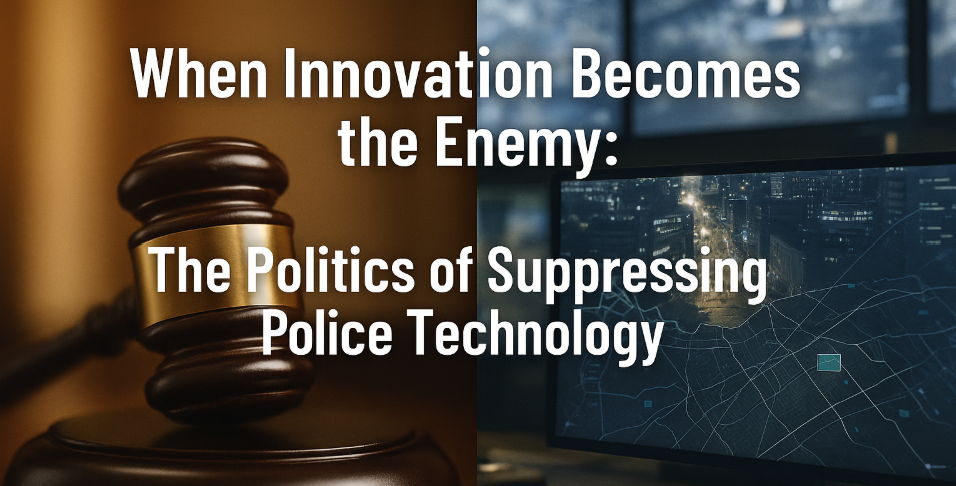By Tom Joyce & Pete Forcelli
Presented by The Finest Unfiltered: The Ten-Four Tavern
Last night on the Ten-Four Tavern podcast, we spoke with former NYPD Chief of Detectives Robert Boyce, whose legendary career spanned decades of major cases and investigative evolution. While the conversation focused on his leadership and investigative experiences, a brief mention of the NYPD’s gang database sparked a much broader discussion; one that has become increasingly urgent nationwide.From New York to Chicago to Washington, a movement is underway to suppress police technologies under the banner of “privacy.” Tools such as ShotSpotter, facial recognition, automated license plate readers, and commercial data access have all become political targets despite being legal, constitutional, and in many cases, life-saving.
Technology on Trial: From Databases to Detection Tools
The NYPD’s gang database has drawn criticism from some city council members who allege bias or privacy violations. In reality, it’s a structured investigative tool — refined over decades — that helps connect shootings, retaliatory acts, and organized criminal groups. It’s audited, reviewed, and governed by evidentiary standards.Are there areas where oversight, policy, or transparency can improve? Of course. Few in law enforcement would object to additional audits, privacy protections, or reporting standards. But instead of improving what exists, activists demand elimination. That’s not reform. That is capitulation.
ShotSpotter and the Chicago Reversal
Chicago’s decision to cancel SoundThinking’s ShotSpotter system epitomizes politics over data. The technology has repeatedly reduced response times and saved lives in neighborhoods plagued by gun violence. Yet city leadership abandoned it under activist pressure fueled by misinformation, including the myth that its microphones record conversations. If the conversation were about oversight or data governance, police would welcome it. But this wasn’t about better policy. It was about demonstrating control. The decision was political theater and the communities most in need of protection will pay the price.
License Plate Readers: The Courts Have Spoken, the Legislators Haven’t
Listened
Automated license plate readers (ALPRs) have survived every serious legal challenge to date. Federal and state courts have upheld their constitutionality, including United States v. Knotts, 460 U.S. 276 (1983), which found that a person traveling on public roads has no reasonable expectation of privacy regarding movements visible to the public. Still, during the mid-2010s, a surge of anti-LPR bills emerged in state legislatures nationwide. These bills, drafted by privacy activists unfamiliar with the technology or legal precedent, sought to ban or severely restrict LPR use.
The tide turned thanks to Vigilant Solutions (now a Motorola company), leading LPR and facial recognition company, and a coalition of public-safety advocates who fought back, state by state, using data, testimony, and case law. They showed how LPRs helped locate murder suspects, rescue abducted children, and solve violent crimes. Without that coordinated effort, the technology’s reach and the number of crimes solved would be a fraction of what it is today.
Facial Recognition and the New Moratorium Movement
Facial recognition has become the next battleground. Cities such as San Francisco, Boston, and Portland have enacted blanket moratoriums, citing bias and privacy risks. Yet as accuracy improves and oversight expands, those arguments grow weaker. Again, if the issue were truly about policy and auditing, law enforcement would support the dialogue. But these moratoriums are not about responsible regulation. They’re about demonstrating political power. When technology helps identify killers, exonerate the innocent, and rescue victims, eliminating it isn’t reform; it’s regression.
The First Amendment Is Not for Sale Act: A Wolf in Privacy Clothing
The proposed First Amendment Is Not for Sale Act sounds noble, but beneath the surface lies another effort to cut law enforcement off from publicly available and lawfully obtained data. For decades, investigators have used commercial and public records within the strict frameworks of the Gramm-Leach-Bliley Act (1999) and the Driver’s Privacy Protection Act (1994). Those laws already regulate access and misuse. If the goal were better safeguards, law enforcement would be the first to the table. But this bill seeks to sever access entirely, crippling lawful investigative work that has solved crimes and saved lives for more than 30 years.
The Real Cost of Suppressing Technology
Across all these examples, the pattern is unmistakable: policymaking driven by perception and control. When technology is labeled as inherently abusive, facts, data, and precedent stop mattering. Where policies, audits, or privacy frameworks fall short, fix them. Bring experts, privacy advocates, and law enforcement to the same table. Find the middle ground. But the ongoing effort to eliminate entire investigative capabilities isn’t about balance. It is simply about power.
This isn’t about protecting communities. It’s about proving that police can be restrained. And the people paying the price will be those who wait longer for help, lose transparency in investigations, and suffer when ideology trumps innovation.
Author Bios
Tom Joyce is a retired NYPD Lieutenant. He is co-host of Ten-Four Tavern.
Pete Forcelli is a retired Deputy Assistant Director of the Bureau of Alcohol, Tobacco,
Firearms and Explosives (ATF) and a former NYPD detective. He is co-host of Ten-Four
Tavern.
Sources Consulted
● United States v. Knotts, 460 U.S. 276 (1983)
● SoundThinking Public Safety Reports (2024)
● Vigilant Solutions Legislative Testimonies (2015–2017)
● Gramm-Leach-Bliley Act (1999)
● Driver’s Privacy Protection Act (1994)

